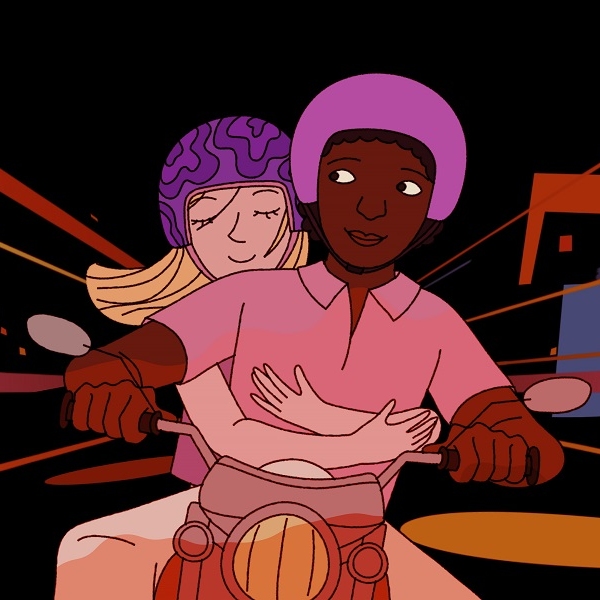There was a time when Ghyslain Raza, BCL/LLB’11, LLM’20, was, arguably, one of the most famous people on the planet – and he hated it. Raza is widely considered to be the “patient zero” of having your life turned upside down by becoming an internet meme.
As a teenager in Trois-Rivières in 2002, Raza was working on visual effects for a school video project. It wasn’t going well.
“I was fed up and wanted to mess around,” he explains in a new film that looks back at his experiences, “and that ended up being the video that you all know, a slapstick video that was meant for my eyes only.”
The video itself needs little introduction. If you have an internet connection, you’ve probably come across images of a 15-year-old Raza mimicking a Star Wars duel in front of a black backdrop, or one of the countless creative variations made in the aftermath. If there was a Mount Rushmore of internet memes, Raza would be on it.
Classmates discovered the video and, without Raza’s consent, put it online. It quickly spread like wildfire. Some estimate that it has been viewed more than a billion times.
It was spoofed or referenced on TV shows ranging from Arrested Development to South Park to American Dad. Stephen Colbert invited his viewers to add imaginative edits to the video. Weird Al Yankovic paid tribute to it in a music video.
Raza himself, and his family, had to contend with more serious consequences. Bullying and abuse at school (he eventually had to switch schools), an avalanche of hateful comments online, reporters turning up unannounced at his house.
Two decades after achieving online infamy, Raza has broken his silence in Star Wars Kid: The Rise of the Digital Shadows, a new National Film Board documentary directed by Mathieu Fournier that examines the effect the video had on Raza’s life. The film does more than that, though.
“I wanted to create a dialogue,” Raza explains. “The documentary does a great job of going beyond the story and being more about engaging and raising awareness about the issues.”
Raza didn’t want the documentary to be just about himself. He wanted to show people the deleterious effects online culture can have on the individuals who become the butt of widespread jokes. Today, online oversharing and overflowing social media profiles are commonplace. Back then, the internet was still the Wild West, with blossoming underground communities. That’s where the Star Wars Kid legend was born.
In the film, Kate Eichhorn, a media studies scholar who explores the effects of digital technologies, describes the video’s lasting impact. “If you want to talk about the history of cyberbullying, the history of memes, the history of things going viral, or the history of digital memory, you kind of have to talk about the Star Wars Kid video.”
Although the incident marked Raza and his family for life, he remained surprisingly grounded throughout the entire ordeal and focused on achieving his goals in adulthood.
Still reeling from reporters knocking on his door and an ultimately halted legal battle against his classmates for uploading the video, Raza moved on to law school at McGill. There, he concentrated on his studies away from the spotlight.
“I didn’t pick law for any conscious reason based on what happened to me,” Raza says. “The lawyers [who represented his family in dealing with the fallout of the video] happened to be wonderful people and made a positive impact on me, but I always had interest in history and philosophy, and McGill’s Faculty of Law extended into those subjects as well.”
Asked if he was ever recognized while at McGill, Raza replies that while it was unavoidable, it never caused him discomfort.
“No one would come up to me and say anything, but maybe they would find out later. I’m assuming it got around and people knew, but everyone was extremely respectful. I never had anything come up, I must say.” Raza did well at McGill, earning both the Wainwright Dissertation Prize and the Henri-Capitant Prize for his graduate work. Today, he is pursuing doctoral studies in law at Queen’s University.
Raza says the new documentary was sparked by a rare one-off interview he did with L’actualité about 10 years ago. Through that journalist he met Fournier, and the pair hit it off. They had a shared vision for what a documentary on his life would look like, specifically that it would attempt to serve as a public good rather than just delve into the gory details.
Something else that interested Raza was the opportunity to explore what happened to him from a more cerebral point of view with interviews with Eichhorn and other experts.
“There’s a surreal element talking about your life story to people who have used it as academic material,” Raza says. “It’s also really interesting to see the contrast between the internet 20 years ago and the internet of today.”
Twenty years ago, Raza wanted nothing to do with capitalizing on his newfound fame. He had opportunities. Jay Leno and Oprah Winfrey wanted to interview him and there were lucrative offers from Japan.
Today, everyone uses their online profiles to sell themselves to varying degrees. In the documentary, Raza goes back to his old school where the video was filmed, and the current students candidly discuss their smartphone obsessions.
“Back then, most of the offers that came my way were mostly negative,” Raza recalls. “They were the kinds of things that stripped me of my dignity. Early on, I took the decision to cut myself off from the circus that was going on.
“There might have been other ways to handle the situation, but looking back on it, I see that I did what was right for me. It was a personal decision, and I would never judge anyone else.”
These days, his online presence is fairly limited.
“I keep a Facebook account just to keep in touch with people,” he says. “It’s probably a mix of a reaction to what happened with me as well as my personality. I’ve always preferred in-person interactions over social media.”


